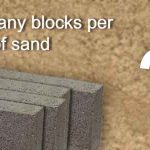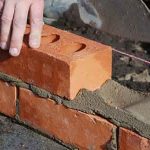In the UK, we are not blessed with the best weather. This means that construction sites are often taken over by rain, which means a lot of the materials can get wet. When materials get wet, it might make it difficult for certain trades to carry out their job.
One job that can prove difficult is bricklaying. If materials become too wet, it can become difficult to work with bricks with mortar? Mortar already contains a specific amount of water so extra moisture can cause issues. But what about the masonry, for example, can you lay wet concrete blocks?
It is possible to lay wet concrete blocks. However, the blocks should not be too wet, as this can cause issues with shrinkage. If it has been raining, then the blocks should be checked to ensure that they are not excessively wet.
If you are laying blocks in dry conditions, then it often helps to spray them with a small amount of water. This will help the mortar and the blocks to form a solid bond.
Can You Lay Concrete Blocks in the Rain?

There are many people who think that it’s not possible to lay concrete blocks in the rain. The laying of blocks is a process that must be done correctly, so that everything sets, and the wall becomes solid.
When preparing mortar, the mix needs a certain amount of liquid. So, it might seem strange to use wet blocks. You might assume that this extra water could cause problems with the mortar. But as we already mentioned, it is often recommended that blocks can be slightly wet before laying, this will not affect mortar in any way.
So, it is possible to lay concrete blocks in the rain. But it’s important to avoid heavy rain and to consider how much moisture the blocks have been exposed to already. Another thing to think about is the rain affecting the mortar. If the rain is heavy, this could wash it away. Which will result in your blocks and mortar not setting correctly.
When your blocks have the right amount of moisture, it is seen to be a good thing. This is because cement products rely on water. So, the right level of moisture will help your blocks to form a strong bond.
How Can You Protect Your Blockwork from the Rain?
After you take time laying blocks and building a wall, the last thing you want is for the rain to undo all your hard work. This means that you should think about ways to protect your blockwork from the rain.
You might be in the middle of a job when heavy rain arrives. While you can lay blocks in light rain, you should avoid torrential rain. So, you should look to protect your blocks using something waterproof like a polythene sheet.
Make sure that the blockwork is completely covered and that no rain can penetrate the freshly laid blocks. Another consideration is frost. The freeze and thaw process can cause problems for your blockwork because of expansion and contraction. So, you should use a hessian blanket to provide insulation if cold is an issue. You can then also cover this with a polythene sheet.
It is also worth thinking about your unused blocks too. So, make sure that you cover these during persistent rain and torrential rain.
What Happens If You Get Rain on Fresh Mortar?
Mortar does require water as part of the mixing process. The correct volume of water will help to create the right consistency. This can then be used in between blocks to form a strong bond.
However, excess moisture can cause problems, so it is best to avoid it where possible. Prior to laying blocks, it often makes sense to check the weather. But even then, showers and torrential rain can appear from nowhere (this is the UK after all). If this does happen, you should try to avoid rainwater from mixing with your fresh mortar.
The blocks and mortar must bond together, but the rain can prevent this from happening. If mortar becomes too wet, then it can prevent it from hardening. This means that you won’t get the correct bond and the wall will become weak and even dangerous.
Furthermore, rain can wash mortar from the wall and that will also weaken the bond. Along with this, it will cause it to stain the wall. So, while it is possible to use fresh mortar in light rain, it is best to avoid too much rain and extra moisture.
Can You Lay Bricks in the Rain?
Blocks are usually used for retaining walls, partitions and foundations which means that their appearance is not too important. However, bricks are different as these are usually used to create a smart-looking finish, such as the exterior of a house. Therefore, it’s important to think before laying bricks in the rain.
Much like blocks, you can lay bricks in the rain. But again, too much moisture can cause issues. This can be even worse than when you are working with blocks because you are trying to achieve a smart finish.
Excess moisture can lead to leaching and cement residues. Along with this, efflorescence can also be an issue. All of these can result in an unsightly finish to your bricks that are front facing.
Conclusion
It is possible to lay wet concrete blocks, but it is important to consider several things. They should not be laid if they are too wet, and you should also consider the weather. If they are too wet, they can weaken the mortar causing a weaker bond.
The important thing is to find the right level of moisture and to protect your blocks should they be exposed to heavy rain or other water sources. This will ensure they do not become too wet and can be laid correctly.




